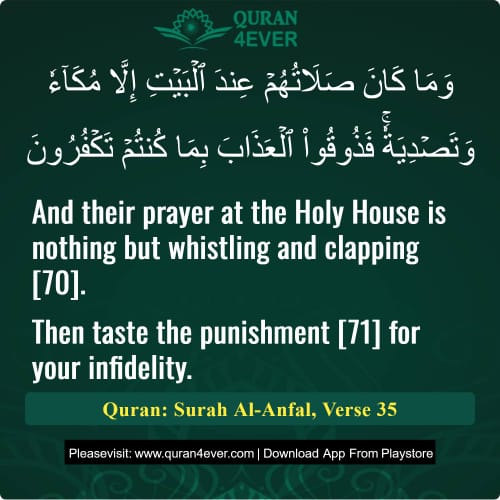
Transliteration:( Wa maa kaana Salaatuhum 'indal Baiti illa mukaaa anw-wa tasdiyah; fazooqul 'azaaba bimaa kuntum takfuroon )
"And their prayer at the Holy House is nothing but whistling and clapping [70]. Then taste the punishment [71] for your infidelity."
This verse condemns the Quraysh's distorted practices at the Ka‘bah—they would whistle and clap, claiming it as worship. They even did this to disturb the Prophet ﷺ during real prayer, thinking it equaled devotion.
This shows that such empty displays are not acts of worship, but mockery, and are rooted in ignorance and arrogance. Even today, practices like clapping in religious settings, borrowed from non-Muslim customs, should be viewed with caution. Imitating disbelievers in rituals is strongly discouraged.
The "punishment" here refers to their defeat at Badr, imprisonment, and disgrace. Yet, such worldly punishments do not reduce their punishment in the Hereafter. It highlights that disbelief and mockery of religion bring both earthly consequences and eternal judgment.
The tafsir of Surah Al-Anfal verse 35 by Ibn Kathir is unavailable here.
Please refer to Surah Anfal ayat 34 which provides the complete commentary from verse 34 through 35.
(8:35) Their Prayer at the House is nothing but whistling and handclapping.[28] Taste, then, this chastisement for your denying the truth.[29]
28. This is to dispel a misconception common among the Arabs of those days. They were generally inclined to assume that since the Quraysh were the guardians and keepers of the Ka’bah and were also engaged in worship at that holy spot, they were recipients of God’s special favours. Here people are told that the defacto guardianship of the Ka’bah should not be confused with its de jure guardianship. For only the God-fearing and pious are the rightful guardians of the Ka,bah. As for the Quraysh, far from behaving in a manner becoming of the guardians of the Ka’bah, they had virtually installed themselves as its masters, and were guilty of preventing people from worshipping there at will. This attitude blatantly betrayed their impiety, and un righteousness. As for their worship in the Ka’bah. it was altogether devoid of religious devotion and sincerity. They neither turned earnestly to God, nor displayed any genuine submission or humility, nor engaged in worshipfully remembering Him. Their worship consisted of meaningless noise and clamour, of acts which seemed closer to play and jest than acts of religious devotion. How could such a guardianship of the Ka’bah and such non-serious acts in the name of worship win God’s favour for them, or secure for them immunity from God’s scourge?
29. The Quraysh believed that God’s punishment necessarily takes the form of some natural calamity or a rain of stones from the sky. They are, however, told that their decisive defeat in the Battle of Badr, which ensured the survival of Islam and spelled death for their much-cherished Jahiliyah was a form of God’s punishment for them.

For a faster and smoother experience,
install our mobile app now.
Related Ayat(Verses)/Topics